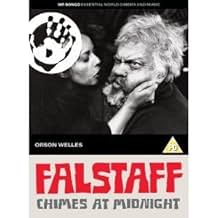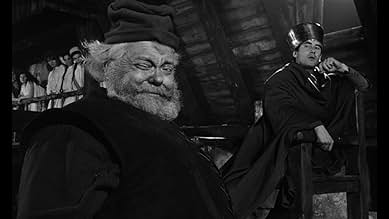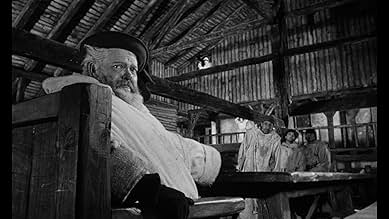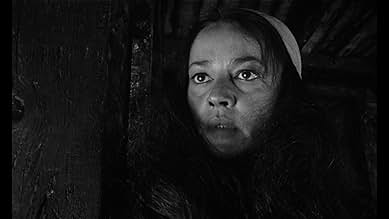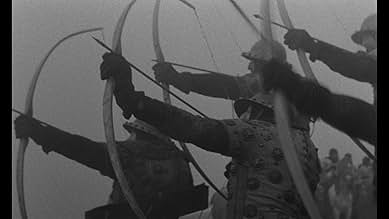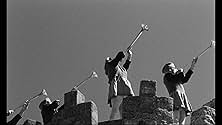NOTE IMDb
7,6/10
11 k
MA NOTE
La carrière du Sir John Falstaff de Shakespeare, tonitruant compagnon du jeune Prince Hal, aux alentours de 1400-1413.La carrière du Sir John Falstaff de Shakespeare, tonitruant compagnon du jeune Prince Hal, aux alentours de 1400-1413.La carrière du Sir John Falstaff de Shakespeare, tonitruant compagnon du jeune Prince Hal, aux alentours de 1400-1413.
- Réalisation
- Scénario
- Casting principal
- Nomination aux 1 BAFTA Award
- 3 victoires et 2 nominations au total
Michael Aldridge
- Pistol
- (as Michael Aldrich)
Andrés Mejuto
- Woman's Tailor
- (as Andres Mejuto)
José Nieto
- Northumberland
- (as Jose Nieto)
Avis à la une
By far the best of Welle's three Shakespearean adaptations this is also arguably THE best Shakespeare on screen. Most filmmakers go for the tragedies - vide Welles himself - or settle for Romeo and Juliet but the History plays are seldom tackled. Here the maestro dips into several texts - most heavily into the two parts of Henry 1V but also Merry Wives, Henry V, Richard 11 - and then welds them together seamlessly to give an in-depth portrait of Falstaff. With a nice touch of irony the narration is spoken by Ralph Richardson who, prior to Welles here, was the definitive Falstaff - and remains so as far as theatre is concerned. It's hard to fault so I won't try, merely revel in a touch of greatness. 10/10
Shakespeare Scholars are always complaining how this film used and abused Shakespeare's plays but I think what was done in this film was pretty clever: Take the character of Falstaff from several plays and piece them together to get a complete picture of the man.
Of the two Orson Welles Shakespeare films I've seen, this one and "Othello" (1954), both had the ability to make me want to read Shakespeare's plays and any film that makes you want to read what the author wrote is a very positive thing to say about a film. So there Shakespeare Scholars!
I did go out and buy the books with the plays used in this film, much like trying to solve a puzzle to see how the pieces really fit. And Orson did twist and bend things a little to make it come out his way.
I also read in Videohound's "World Cinema" (1999) by Elliot Wilhelm that this film may be getting a restoration. If it's as good a restoration as "Othello", I'm looking forward to it!
Welles as Falstaff really shines in this film and Falstaff's later rejection by Henry V is one of the most sobering in cinema. And Welles still has some very creative power left in him by 1965, look at the Battle of Shrewsbury scenes. When it comes to battle scenes they've been done probably only 10 different ways by 1000 directors in a 1000 movies over the years, but this one is probably the most memorable. It's also strange to have in the heat of battle Falstaff looking like a big metal beach ball running around back and forth trying to avoid any conflict.
This film is also a good example of good music and how to use it in a film and it's another one of my favorite movies about Merrie ol' England.
Of the two Orson Welles Shakespeare films I've seen, this one and "Othello" (1954), both had the ability to make me want to read Shakespeare's plays and any film that makes you want to read what the author wrote is a very positive thing to say about a film. So there Shakespeare Scholars!
I did go out and buy the books with the plays used in this film, much like trying to solve a puzzle to see how the pieces really fit. And Orson did twist and bend things a little to make it come out his way.
I also read in Videohound's "World Cinema" (1999) by Elliot Wilhelm that this film may be getting a restoration. If it's as good a restoration as "Othello", I'm looking forward to it!
Welles as Falstaff really shines in this film and Falstaff's later rejection by Henry V is one of the most sobering in cinema. And Welles still has some very creative power left in him by 1965, look at the Battle of Shrewsbury scenes. When it comes to battle scenes they've been done probably only 10 different ways by 1000 directors in a 1000 movies over the years, but this one is probably the most memorable. It's also strange to have in the heat of battle Falstaff looking like a big metal beach ball running around back and forth trying to avoid any conflict.
This film is also a good example of good music and how to use it in a film and it's another one of my favorite movies about Merrie ol' England.
I won't belabor the point that you can gather from reading 40+ other reviews, so I will offer a few short words on the theme of the movie, as well as caveat, for watching Orson Welles' Chimes at Midnight.
The film overall deals with that time-honored notion noted by St. Paul "When I was a child, I used to talk like a child, and see things as a child does, and think like a child; but now that I have become an adult, I have finished with all childish ways." Prince Hal is growing up and becoming an adult, and as such must soon leave his childish pranks and habits behind. His friend, Falstaff, is that childhood friend (paradoxically old in age, as if he never grew up himself). Boisterous, drunk, and a glutton, the blowhard gleefully recounts all the good times that he, Prince Hal, and their other misfits used to have, doing the things that children and adolescents do, like being a nuisance, harassing others, and goofing off. It is the type of life Falstaff still leads and he is quite happy with it. Prince Hal is, too, until the weight of responsibility is slowly thrust upon him thanks to his sick father. As the stakes are raised, he slowly loses the time and desire to be a silly young boy and now must be a man.
Falstaff is oblivious to this development all the way until the end, thinking that these are just momentary phases before the parties can begin anew. He is ever hopeful that the Prince and the world will see things his way. He fails to see how the world moves past a fat, blundering fool. His love for the prince, for the girls of the bawdy bar, for his compatriots is, while sometimes humorous and self-serving, he nonetheless wishes no real ill on anyone and merely lives for fun and pleasure. In his old age, he has decided that being an adult (if he ever was one) is not something worth putting time and energy in to. He is unimportant and carefree enough to have that luxury; however, his closest friends cannot shirk away from their duties as men, and thus Falstaff fails to realize how he is left behind.
All of this is turned into a moving portrait. We realize that Falstaff is wrong, and that sometimes the world calls for more than just joking around, goofing off and indulging one's self. But we sympathize with him, because we can see a gentle and loving person underneath the bluster and idiocy - and perhaps we ourselves wish the world were more "childish" and carefree. At the climactic battle scene (were Welles' camera work makes a hundred men or less look like a thousand), men grind and pulverize each other into hamburger meat - but Falstaff never manages to hurt a single soul. Perhaps there is some good in being childish!
For those wishing to watch the movie, the Criterion package is an excellent one. The customary supplemental materials are fascinating, and the picture brings out Welles' cinematography. Criterion and co. did there best with the sound, and the sound is the biggest single issue with which you will struggle with (or at least I did) with Chimes. Even with work done on it, the sound levels are inconsistent, especially with actors' lines. Sometimes whole scenes will go by with what sounds like dubbers mumbling their lines, straining your ears and making you crank the volume up on your TV. Then all of the sudden someone will speak loudly and clearly, blowing you back with the force of it and making you quickly turn the volume back down... only for the process to repeat again. I have not done this yet, but I would probably recommend watching with subtitles on to help alleviate the issue of figuring out what some of the whispers and mumbles are supposed to be. Not an elegant solution, but with Welles' later work, you will have to deal with some technical issue or another.
Don't let the above turn you off from seeing this beautiful, and moving film. It is a worthy adaptation and remix of Shakespeare and one of Welles' greatest movies.
The film overall deals with that time-honored notion noted by St. Paul "When I was a child, I used to talk like a child, and see things as a child does, and think like a child; but now that I have become an adult, I have finished with all childish ways." Prince Hal is growing up and becoming an adult, and as such must soon leave his childish pranks and habits behind. His friend, Falstaff, is that childhood friend (paradoxically old in age, as if he never grew up himself). Boisterous, drunk, and a glutton, the blowhard gleefully recounts all the good times that he, Prince Hal, and their other misfits used to have, doing the things that children and adolescents do, like being a nuisance, harassing others, and goofing off. It is the type of life Falstaff still leads and he is quite happy with it. Prince Hal is, too, until the weight of responsibility is slowly thrust upon him thanks to his sick father. As the stakes are raised, he slowly loses the time and desire to be a silly young boy and now must be a man.
Falstaff is oblivious to this development all the way until the end, thinking that these are just momentary phases before the parties can begin anew. He is ever hopeful that the Prince and the world will see things his way. He fails to see how the world moves past a fat, blundering fool. His love for the prince, for the girls of the bawdy bar, for his compatriots is, while sometimes humorous and self-serving, he nonetheless wishes no real ill on anyone and merely lives for fun and pleasure. In his old age, he has decided that being an adult (if he ever was one) is not something worth putting time and energy in to. He is unimportant and carefree enough to have that luxury; however, his closest friends cannot shirk away from their duties as men, and thus Falstaff fails to realize how he is left behind.
All of this is turned into a moving portrait. We realize that Falstaff is wrong, and that sometimes the world calls for more than just joking around, goofing off and indulging one's self. But we sympathize with him, because we can see a gentle and loving person underneath the bluster and idiocy - and perhaps we ourselves wish the world were more "childish" and carefree. At the climactic battle scene (were Welles' camera work makes a hundred men or less look like a thousand), men grind and pulverize each other into hamburger meat - but Falstaff never manages to hurt a single soul. Perhaps there is some good in being childish!
For those wishing to watch the movie, the Criterion package is an excellent one. The customary supplemental materials are fascinating, and the picture brings out Welles' cinematography. Criterion and co. did there best with the sound, and the sound is the biggest single issue with which you will struggle with (or at least I did) with Chimes. Even with work done on it, the sound levels are inconsistent, especially with actors' lines. Sometimes whole scenes will go by with what sounds like dubbers mumbling their lines, straining your ears and making you crank the volume up on your TV. Then all of the sudden someone will speak loudly and clearly, blowing you back with the force of it and making you quickly turn the volume back down... only for the process to repeat again. I have not done this yet, but I would probably recommend watching with subtitles on to help alleviate the issue of figuring out what some of the whispers and mumbles are supposed to be. Not an elegant solution, but with Welles' later work, you will have to deal with some technical issue or another.
Don't let the above turn you off from seeing this beautiful, and moving film. It is a worthy adaptation and remix of Shakespeare and one of Welles' greatest movies.
This is all more of a fascinating and compelling film because of its difficult-to-find nature, and the feeling of its being neglected, despite much praise from film and Welles scholars. This forms part of the compelling sequence of Welles films that began with 1958's "Touch of Evil", and ran through to his final film, 1973's "F For Fake", a film I really want to see. The version I managed to locate of "Chimes..." revealed a film with, yes, some technical problems (the sound is a little poor, but I'd almost expected worse), and the feeling of being made on-the-hoof. But what a film it is! Certainly hitherto the finest and most moving Shakespeare film adaptation that I have seen; I was happy to be able to write on it for my recent University Tripos exam.
Welles is possibly not a perfect Falstaff - failing to some degree to capture the character's jovial humour - but he gives a good performance in a limited, but powerfully melancholy vein. Keith Baxter makes Hal very much his own, providing curious contrasts to both of his father figures. Gielgud is as sublime as ever, and his scenes are beautifully directed - one wouldn't know the problems Welles had in terms of actor availability, considering how effective the medium close camera-work is.
The poetry of the "Sleep" speech is absolutely overpowering in Gielgud's rendition, and his facial expressions, eyes cast in shadow, are perfectly haunting. The strength of his performance is crucial; Henry IV is thus very much a figure with dignity but guilt and a coldness matching the stone of his solitary court - brilliant use of some sort of cathedral. Margaret Rutherford and Tony Beckley certainly add a lot to the mix, as does the bizarrely ill-fitting Jeanne Moreau, that most French of actresses playing an English whore. The tenderness she feels for Falstaff is crucial in softening his character a bit; Moreau's bedraggled siren works as a necessary example of the femininity of the Tavern, as compared to the masculine world of battle and court that Falstaff is so lost in. What a striking actress she is here; piercing, soulful eyes, such lips and flowing dark hair. It is a skittish and perfect performance fitting in with Welles' fantasia of "Merrie England". That most of this was filmed in Spain conveys the sense of this as an artificial, beyond-reality dream of the Paradise Lost. The film can effectively be seen as Welles expressing his interest in Western society's mourning a lost golden age - in this case, "Merrie England", which Falstaff embodies. The rational and dulling technocracy of the future is suggested by the coldness of Gielgud and Baxter towards the end, and the atmosphere of court.
The actor playing Justice Shallow is supremely odd and bewitching in his shrill little voice; his blustering humour and reminiscence taking on much melancholy as the film moves inexorably towards its tragic, deathly close. The scene where Falstaff finds out Hal is now King, is wonderfully shown in long shot by a still camera; a depression and drift towards disillusion shown. When Falstaff finds out, the lift in spirits is conveyed with his movement towards the camera. It's a return to the general sense of camera mobility around Falstaff - contrasting with the stillness around Bolingbroke. The final rejection of Falstaff that follows is beautifully filmed by Welles, played ambiguously by Baxter and movingly by Welles.
What must be the most remarkable sequence is the Battle of Shrewsbury; it is this that will haunt the mind long into the ether... Savage, indiscriminate quickness of brutal death emphasised in quick cuts. The fighting is impersonal and grimly realistic; ranks of silhouetted men and horses charging in, arrows - unlike in Olivier's "Henry V" - being shown cascading into and piercing ranks of horses and soldiers. The dry ground dissolves gradually to mud, and a haunting, holy-sounding piece of choral music strikes a chilling note of ironic contrast. Mankind has been reduced by war back to the very mud from which it originally arose. All sense of 'glory' is dissipated and cut away, by this frightening, near-ten minute sequence. It is one of the most gripping, utterly transcendent and powerful sequences I have seen in the whole of my film viewing.
"Chimes at Midnight" is a marvel of a film; this is a Welles film in its true form and not tampered with - "The Magnificent Ambersons" is the most shameful previous example of this. "Chimes..." stands as a complex masterpiece; partly an elegy for an innocence than may never have truly existed, but which Welles *feels* deeply. Track this down if you can as it is something special; let's hope it is soon restored to the best possible condition. It is wonderfully slanted Shakespeare; history plays fashioned into a tragedy, and painted from the most compelling cinematic palette. And above all, it is wonderful Welles.
Welles is possibly not a perfect Falstaff - failing to some degree to capture the character's jovial humour - but he gives a good performance in a limited, but powerfully melancholy vein. Keith Baxter makes Hal very much his own, providing curious contrasts to both of his father figures. Gielgud is as sublime as ever, and his scenes are beautifully directed - one wouldn't know the problems Welles had in terms of actor availability, considering how effective the medium close camera-work is.
The poetry of the "Sleep" speech is absolutely overpowering in Gielgud's rendition, and his facial expressions, eyes cast in shadow, are perfectly haunting. The strength of his performance is crucial; Henry IV is thus very much a figure with dignity but guilt and a coldness matching the stone of his solitary court - brilliant use of some sort of cathedral. Margaret Rutherford and Tony Beckley certainly add a lot to the mix, as does the bizarrely ill-fitting Jeanne Moreau, that most French of actresses playing an English whore. The tenderness she feels for Falstaff is crucial in softening his character a bit; Moreau's bedraggled siren works as a necessary example of the femininity of the Tavern, as compared to the masculine world of battle and court that Falstaff is so lost in. What a striking actress she is here; piercing, soulful eyes, such lips and flowing dark hair. It is a skittish and perfect performance fitting in with Welles' fantasia of "Merrie England". That most of this was filmed in Spain conveys the sense of this as an artificial, beyond-reality dream of the Paradise Lost. The film can effectively be seen as Welles expressing his interest in Western society's mourning a lost golden age - in this case, "Merrie England", which Falstaff embodies. The rational and dulling technocracy of the future is suggested by the coldness of Gielgud and Baxter towards the end, and the atmosphere of court.
The actor playing Justice Shallow is supremely odd and bewitching in his shrill little voice; his blustering humour and reminiscence taking on much melancholy as the film moves inexorably towards its tragic, deathly close. The scene where Falstaff finds out Hal is now King, is wonderfully shown in long shot by a still camera; a depression and drift towards disillusion shown. When Falstaff finds out, the lift in spirits is conveyed with his movement towards the camera. It's a return to the general sense of camera mobility around Falstaff - contrasting with the stillness around Bolingbroke. The final rejection of Falstaff that follows is beautifully filmed by Welles, played ambiguously by Baxter and movingly by Welles.
What must be the most remarkable sequence is the Battle of Shrewsbury; it is this that will haunt the mind long into the ether... Savage, indiscriminate quickness of brutal death emphasised in quick cuts. The fighting is impersonal and grimly realistic; ranks of silhouetted men and horses charging in, arrows - unlike in Olivier's "Henry V" - being shown cascading into and piercing ranks of horses and soldiers. The dry ground dissolves gradually to mud, and a haunting, holy-sounding piece of choral music strikes a chilling note of ironic contrast. Mankind has been reduced by war back to the very mud from which it originally arose. All sense of 'glory' is dissipated and cut away, by this frightening, near-ten minute sequence. It is one of the most gripping, utterly transcendent and powerful sequences I have seen in the whole of my film viewing.
"Chimes at Midnight" is a marvel of a film; this is a Welles film in its true form and not tampered with - "The Magnificent Ambersons" is the most shameful previous example of this. "Chimes..." stands as a complex masterpiece; partly an elegy for an innocence than may never have truly existed, but which Welles *feels* deeply. Track this down if you can as it is something special; let's hope it is soon restored to the best possible condition. It is wonderfully slanted Shakespeare; history plays fashioned into a tragedy, and painted from the most compelling cinematic palette. And above all, it is wonderful Welles.
(Flash Review)
Very rarely has a voice been so perfectly matched to the poetic genre of Shakespeare. His deep and rich voice bellows out lines with great authority and emotion. I have a strong dislike for Shakespeare as I've never been able to fully comprehend the dialog. But this was an Orson film so I gave it my time and was rewarded by well-composed shot framing and interesting camera angles as well as his distinctive voice. The plot was about the betrayal of friendship and revolves around kings and people ascending to power while some get left behind. Great acting, a meaty story and if you like both Shakespeare and Orson Welles, don't miss it.
Very rarely has a voice been so perfectly matched to the poetic genre of Shakespeare. His deep and rich voice bellows out lines with great authority and emotion. I have a strong dislike for Shakespeare as I've never been able to fully comprehend the dialog. But this was an Orson film so I gave it my time and was rewarded by well-composed shot framing and interesting camera angles as well as his distinctive voice. The plot was about the betrayal of friendship and revolves around kings and people ascending to power while some get left behind. Great acting, a meaty story and if you like both Shakespeare and Orson Welles, don't miss it.
Le saviez-vous
- AnecdotesDespite portraying Falstaff as a grossly obese man, Orson Welles actually had to diet to slim down for the role.
- GaffesThe corpse of Hotspur opens and closes his mouth several minutes after his death.
- ConnexionsFeatured in The 43rd Annual Academy Awards (1971)
Meilleurs choix
Connectez-vous pour évaluer et suivre la liste de favoris afin de recevoir des recommandations personnalisées
- How long is Chimes at Midnight?Alimenté par Alexa
Détails
- Date de sortie
- Pays d’origine
- Langue
- Aussi connu sous le nom de
- Chimes at Midnight
- Lieux de tournage
- Calatañazor, Soria, Castilla y León, Espagne(London streets scenes)
- Sociétés de production
- Voir plus de crédits d'entreprise sur IMDbPro
Box-office
- Budget
- 800 000 $US (estimé)
- Montant brut aux États-Unis et au Canada
- 126 724 $US
- Week-end de sortie aux États-Unis et au Canada
- 13 630 $US
- 3 janv. 2016
- Montant brut mondial
- 126 724 $US
- Durée1 heure 59 minutes
- Couleur
- Mixage
- Rapport de forme
- 1.66 : 1
Contribuer à cette page
Suggérer une modification ou ajouter du contenu manquant




